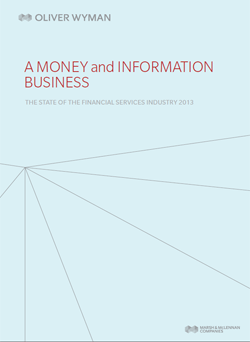Bei Finanzdienstleistung geht es um die Kombination von Geld und Informationen.
This year’s State of Financial Services examines the industry’s greatest opportunity, and its greatest threat: information. But it is not a paper about “big data”. Rather, it is a paper about the migration of trillions of dollars of market value, and where that value will settle.
You may be reading this paper on a tablet. You would not have read our 2008 report that way. You may use your smartphone for travel directions, reading the news, getting stock quotes, making bookings and listening to music. You didn’t five years ago. You may connect with your friends on Facebook or watch movies on your laptop, streamed from the internet. Again, you probably didn’t do those things five years ago.
Yet, if you are a banker or an insurer, your work life has probably been little affected by the rapid growth of information. How do you now set prices, underwrite loans or policies, assess performance, segment customers and measure their satisfaction? Chances are your practices are much as they were in 2008 (or perhaps even 1998 or 1988). Though traditional financial firms produce, consume and transmit vast amounts of information, they have yet to use it to change the way they make their most critical decisions.
Traditional financial services firms have two significant problems: they are under near term earnings pressure and their business model is under strategic threat. Fortunately, both problems have the same solution, and it is a very powerful one: information.
Quelle: Oliver Wyman
Die Studie „Financial Services in 2013 – A Money and Information Business“ kann hier direkt heruntergeladen werden.



